June 13, 2025 | 07:57 GMT +7
June 13, 2025 | 07:57 GMT +7
Hotline: 0913.378.918
June 13, 2025 | 07:57 GMT +7
Hotline: 0913.378.918
When I described that feeling of refreshment, Mr. Bui Minh Hoa, owner of Dao Bau farm (My Duc commune, An Lao district, Hai Phong city) smiled and said: "This farm may not make a lot of profit, but things like that feeling can't be bought by money.
In the past, when I was in the petroleum and transportation business, I made a lot of money, but I felt that my hands and legs did not labor, only my mouth did, that is, directing. Ever since I worked as a farmer, except for when I sleep, I always had laboring work to do, such as going to the pond to feed fish and shrimp, going to the barn to feed the peacocks, pigeons, pigs and eat with the workers. That is also my destiny, my passion, but farming rarely sees any profit, every time I earn a few dong, I invest in facilities and improve the land."
Taking his motorbike, he drove me around a huge farm, including: Cultivation area with thousands of fruit trees such as Dien pomelo, guava pear, banana, jackfruit grown oragnically; Livestock area with 4 pig farms holding 8,000 breeding pigs, 10 laying hens following the model of allowing them to listen to music every day, yielding 30,000 eggs; Aquaculture area with 20 million fingerlings daily yield, each year it yields thousands of tons of fish meat.
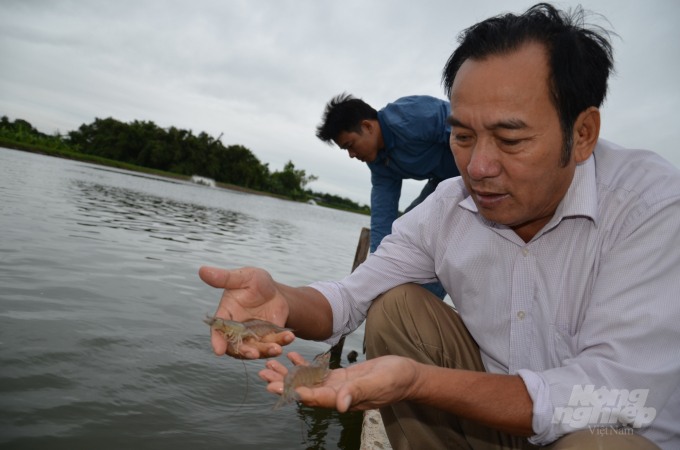
Mr. "Fisherman Hoa" checking the shrimps in his pond. Photo: Duong Dinh Tuong.
Before Covid struck, each year the farm attracted around 10,000 visitors, but few people knew that in order to obtain such property, he had to go through 37 trials, over 3,000 sleepless nights. This was originally a wasteland or one-crop rice land of the farmers that he bought and spent money on to renovate into a prestigious farm in 2005, but then some relatives were instigated to suddenly demanded the land back without returning the money.
When the demand was not fulfilled, hundreds of people burning with anger, came with knives and sticks in their hands to cut down all the trees, killed 50 cows with rat bait and dropped pesticides into the pond to kill tons of fish. There are even women who pulled down their pants to tease, challenge him and the workers. If they accidentally hit them, they will have an excuse to continue wreaking havoc.
That was during the day, the night was not any calmer because there were still intruders, sometimes they smashed the beekeeping crates, sometimes they used gasoline to burn down the warehouse containing many types of agricultural tools. After 7-8 years of conflict, he could only return home to visit his mother once every month, even though his hometown was just over 10 kilometers away, he usually returned home in the evening, when his mother was already asleep, and left home while she was yet to wake. When he won the lawsuit, the troublemakers' leader was sent to prison, so many gas stations and trucks had to be sold, so many years of human life were lost, but he still persevered to revive them all...
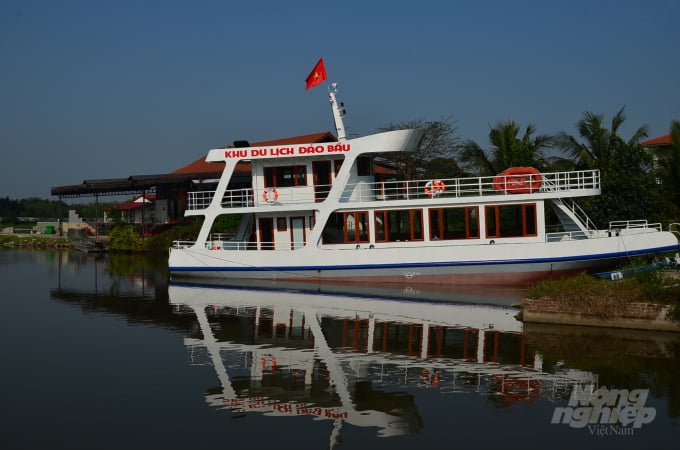
A corner of Bau island tourist area - a model of rural tourism experience by Mr. Bui Minh Hoa. Photo: Duong Dinh Tuong.
Pointing to a rice tree in a corner of the farm, he said, that was his milestone when at the age of 12, he decided to bring only 3 nets and leave home for Hanoi, and then he accidentally went on to Tuyen Quang, Son Duong district, and sat under this very tree, partly because of hunger, partly because of homesickness, crying. The next morning, he woke up and cut 5 forest banana trees to make rafts, dropped his fishing nets along the river to Binh Ca ferry, exchanged fish for sticky rice cake to eat. Over 50 years later, when the petroleum and transportation business was successful, he went back to buy the same old rice tree belonging to the Xuan's family and brought it back to plant as a souvenir.
I asked him why he had the idea of combining agriculture and tourism? He replied that at first, he only thought about farming, but many friends came to encourage him to also do tourism because nature gave this place a herd of storks, a rare beautiful C-shaped curved river.
Therefore, he wants to teach the youth, especially the students, about the old life of his ancestors as well as his life from the age of 7 to 70 with more than 60 years working in the aquaculture sector: "My family was poor, both of myparents lived by fishing. In the blistering cold winter, at 5 am, before going to work for a cooperative, my mother woke me up so she could go fishing with me.
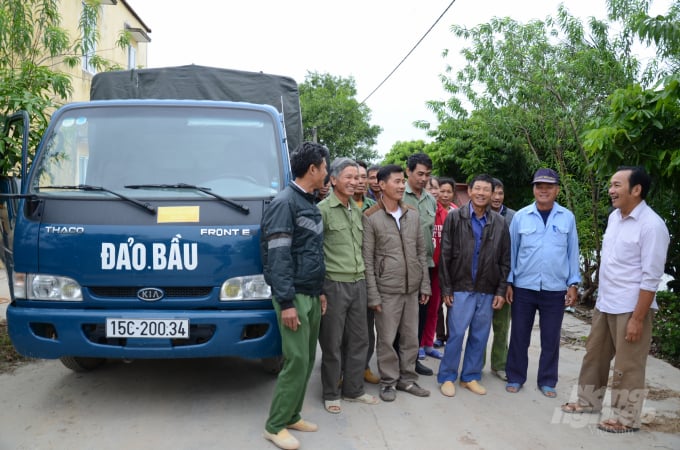
Mr. Hoa (far right) talking with workers. Photo: Duong Dinh Tuong.
At the head of the field, my mother gathered some straw to cover the four sides around me from the cold, then waded down to find fish because it was too cold to swim, her body was stiff. Her hands at that time could not grip tightly to catch fish but only scooped them up. When put in the basket, the fish can't move, only until the sun comes up that they start to struggle.
Mother taught me, to shelter from the cold, perch often raise their heads to the shore, while catfish and banana fish often swim on the field, their tails waggle on both sides leaving a streak in the mud, just follow that trail and you'll find them buried in the mud, with only their noses up to breathe.
It's cold, only the carps still function. Whenever we see them swimming around in the deepest corner of the field then stand on the bank and stick our feet out, swish into a puddle and then go around looking for all kinds of perch, catfish, banana fish, when we return, the carps would have swam down to the bottom of the puddle to stay warm, now we just need to catch them.
August with cool breezes, my mother built a trench that flows from one field to another, deepened and then drained, smoothed the two banks, during the day the fish got used to it, at night they still followed that path, seeing a strange field they will all jump into it…
My mother taught me these skills when I was more than 5 years old, by the age of 7, I had already caught fish and saved enough money to sew my first Western clothes. At 12 years old, I had enough money to buy a Favorit bicycle, a Poljot watch, a Xieng Mao radio, among the earliest in the village.

The old poor farmhouse was built in the middle of Mr. Hoa's estate. Photo: Duong Dinh Tuong.
Later, because of my passion for fishing, I decided to drop out of school and went to cast net on a small boat, exchange fish for sticky rice cake to eat, and at night, tied the boat right under a tree to sleep. The teacher came to my house and told my parents: "I encourage you to let him go to school, he's very good at math! I have taught for many years but I have never seen anyone as excellent as he is."
My parents did not know where their son was, so they kept looking for me on the riverbank, from one river to another, finally it took an entire week to find me at the part of the river bordering Hai Duong province. When I got home, I was beaten by my father and he made me dig a hole to bury my feet in, but when he left, I dig up the ground to hide in Tuyen Quang and continued fishing.
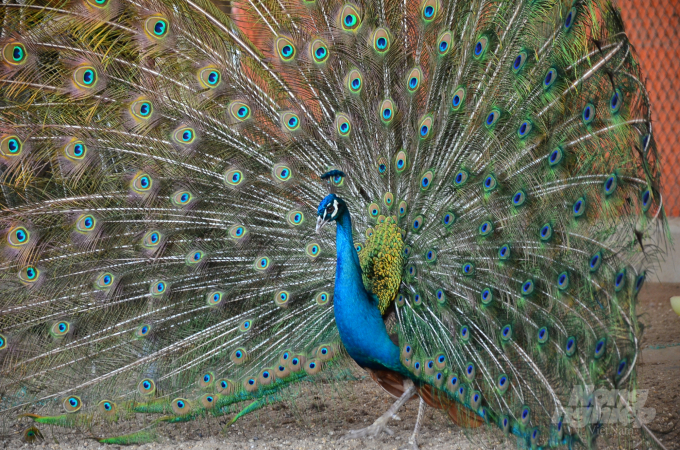
A peacock dancing in the garden of Mr. Hoa's house. Photo: Duong Dinh Tuong.
Later on in life, even though he worked as a worker, driver, a trader of petrol and oil, or in the transportation business, Mr. Hoa never stopped his fishing career. After the litigation incident passed, his farm was one of two establishments in Hai Phong that was allowed by the government to pilot the rural tourism model for 2 years, but it was immediately struck by the Covid pandemic, only receiving a small number of visitors so it was allowed to be piloted again for another 2 years.
Currently, the city is assigning 10 departments, branches to support him, such as the Department of Tourism to help train, promote and connect guests; The Department of Agriculture and Rural Development helps with farming and livestock, while An Lao district helps with roads and entrances. But in order to do tourism, he wished Hai Phong would allow a mechanism so that some construction items could be built for guests to have food and accommodation.
Bringing everyone into his miniature "agricultural museum", he tried to grind rice, pound rice, and then showed familiar farmer's tools such as a perch trap, a carp trap, a shrimp catcher, slingshots, fish lamps...or plows and harrows, the improved vehicle from the past is now a synchronous mechanized model consisting of a plow, a seeding machine, a transplanter and a Japanese harvester.

The joy of the students visiting Mr. Hoa's farm to experience rural tourism. Photo: Documentation.
He explained to the students who came to experience that: "If you can't go to school like Uncle Hoa or your grandparents did in the past, you have to do farming with buffaloes and plows, even pulling the plow manually was also very hard.
Grinding rice, pounding rice or slapping water with a rope bucket is very tiring, yet people still didn't have enough rice to eat. If you don't study, I will tell the story of when I didn't study as a child, but now I regret it as I grow old. If you study hard, farming in this 4.0 era, 1 transplanter can transplant 10 samples a day, equal to 100 people and 1 plow equal to 100 buffaloes.
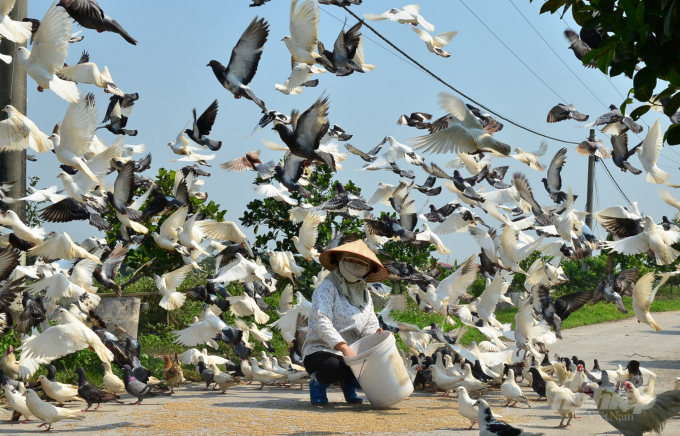
Farm workers feeding pigeons. Photo: Duong Dinh Tuong.
The poor farmhouse, facing the river with earthen walls and thatched roof was restored from his childhood memories and the village workers who had never built it before, while the 200-year-old landowner's house, he collects to introduce to students hoping to show them in real life, not just in books.
In the farm, there is also a water house to organize water puppet shows, describing all the work of farmers in the Northern Delta. The workers on the farm may be pulling fish, but as soon as there are guests, they stop to perform immediately because they were previously trained by artisans. Normally only the puppet is seen in the front but here students can go behind the scenes to see how people control the puppet, the structure of how the puppet works.
In addition to catching fish by slinging, pulling nets or catching ducks, Mr. Hoa also invites students to build rafts so that, if unfortunately, there are floods and natural disasters, they would to know how to survive. He lets them practice transplanting, plowing, harrowing... how to get clean products, observe how the plant is grown by seeding, by grafting. He shows them the scene of the storks returning to nest in the early afternoon, the bees return to make honey. He shows them the locusts, grasshoppers, eels and frogs in the wild so that they can know to treasure them in the future.
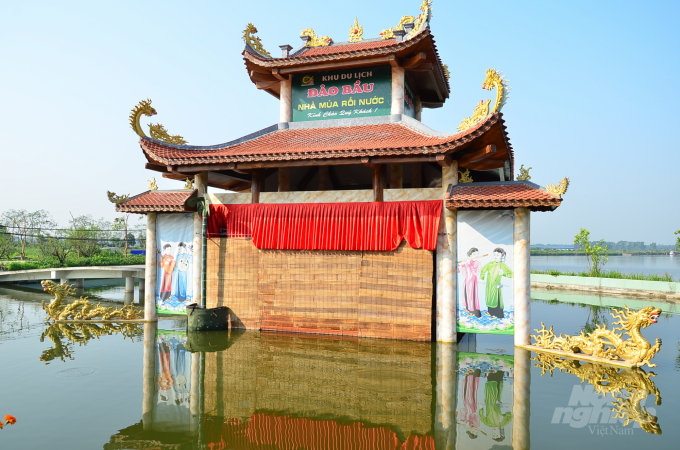
Water puppet area. Photo: Duong Dinh Tuong.
His eyes light up when he talks about the things he plans to do such as a football field, a swimming pool for older children, a play pool for young children, a flower growing area or a fishing and fruit picking area in the garden for parents while waiting for their children to experience.
His aspiration to the end of his life is to complete all subdivisions on the farm according to each function, complete the model of rural tourism, agriculture experience and pay off all debts.
Translated by Nguyen Hai Long
/2025/06/12/3721-2-202745_83.jpg)
(VAN) TH made an impression at Seoul Food 2025 with its line of natural beverages, paving the way for Vietnamese food products to enter the South Korean market.

(VAN) Soc Trang's success in rice exports stems from a strategy of developing fragrant and specialty rice cultivation areas and standardizing production toward low-emission practices.
/2025/06/11/1311-5-120811_839.jpg)
(VAN) The pig farming industry is facing the challenge of comprehensive restructuring to meet requirements for quality, safety, traceability, and market expansion both domestically and for export.

(VAN) Vietnam considers participating in ALGROALBA in order to expand agricultural production, coordinate the assessment and effective exploitation potential land.
/2025/06/05/5314-1-184727_407.jpg)
(VAN) From seemingly worthless fish scales and skin, enzymes and lactic ferments can transform by-products into peptides, opening a sustainable, effective business direction and elevating Vietnamese seafood.

(VAN) TTC AgriS and IFC signed a strategic partnership to develop a sustainable agricultural value chain, aiming to achieve the Net Zero target by 2035.

(VAN) Seafood by-products are opening a new path, combining green growth and technological innovation to enhance the industry's value.